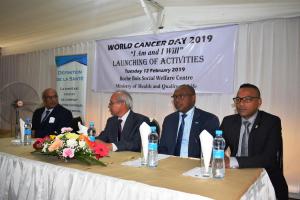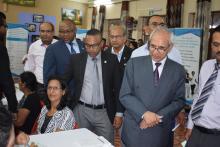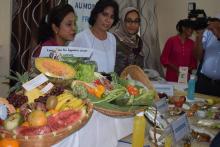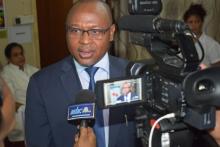WORLD CANCER DAY 2019: ‘I Am And I Will’. A Call for Personal Commitment And Action To Fight Cancer
Every year the World Cancer Day is marked globally on 4th of February to raise awareness and educate the population across the globe about cancer and unite efforts be it governments or individuals to take action against the disease to save millions of preventable deaths. In Mauritius, the World Cancer Day was marked this year under the theme ‘I Am And I Will’ on 12 February 2019 at Roche Bois Social Welfare Centre. On this occasion, Dr Hon. Anwar Husnoo, Minister of Health and Quality of Life launched a series of activities in view of sensitizing people on the prevention and control of cancer in the country. Eminent personalities namely the Lord Major of the Municipal Council of Port Louis, Mr Daniel Eric Clive Laurent and Dr Laurent Musango, WHO Representative in Mauritius were present during the official launching of the activities.
Dr Hon. A. Husnoo , in his speech, stated his appreciation that a large number of people was attending the launching of activities and he added that ‘this is an indication that people are aware of the magnitude of the problem and they show their interest in participating in the national prevention and control programme against cancer that is being carried out by the Ministry.’ Right at the start, the Health Minister expressed his concern on the rising number of new cancer cases in Mauritius. According to the Cancer Registry, there were 2500 new cases of cancer in 2015 and the number of death due to cancer has also increased. In fact, 13.3% of deaths in 2015 in Mauritius were due to cancer and in Rodrigues, the figure was 14.3%.
Cancer is the third cause of mortality in Mauritius after diabetes and cardiovascular diseases, recalled the Health Minister who also highlighted that cancer is the 6th cause of admission in hospitals in Mauritius. According to the latter, the ageing of the population and unhealthy lifestyle are the main factors contributing to the rising number of cancer in the country. The Health Minister emphasized on the measures taken by the Ministry of Health and Quality of Life to improve palliative care and treatment, including the building of a news hospital for cancer. The Government of Mauritius has started the treatment of Hepatitis C, said the Minister of Health and Quality of Life, to combat liver cancer. Dr Hon. Husnoo made an appeal to the population to continue the immunization of Hepatitis B and HPV vaccinations to prevent respectively liver and cervical cancer.
Dr Laurent Musango, WHO Representative in Mauritius, in his address, highlighted the fact that cancer is remains one of the main causes of death worldwide. It was pointed out that in 2012, there were around 14 million of cancer cases and 8.2 million of deaths, that is more than half of them. In 2018, there were 18.1 million of new cases and 9.6 million of death due to cancer. According to Dr Musango, the prevalence of cancer in the African region is relatively low as compared to developed countries but the number of new cases is expected to double in 2040.
The increasing cancer burden in Africa include increasing exposure to known cancer risk factors can be explained by the main risk factors: tobacco use, sedentary lifestyle, unhealthy diets, alcohol use and environmental pollution. Dr Musango added that there are also additional factors that are contributing to the rise of the cancer burden in Africa, such as the epidemiologic and demographic changes that are currently taking place. The WHO Representative in Mauritius acknowledged the significant progress made in the diagnosis and treatment of cancers in developed countries which resulted in better prognosis and enhanced survival rates for cancers in high-income countries with 5-year survival. ‘Unfortunately’, said Dr Musango, ‘most cancer patients in Africa are diagnosed at a late stage and the prognosis for a positive outcome is lessened, even in cases where treatment is available and affordable.’
Dr Musango made an appeal to the whole of the population including the private and public sector, civil society and NGOs and other partners to join hands together to better fight cancer. ‘This can be done by creating conducive environment where the risk factors for cancer such as alcohol abuse and tobacco are practically inexistent. The environment should also promote the practice of physical activity and encourage the consumption of healthy nutrition. The WHO Representative in Mauritius made reference to the survey report published recently by the University of Cape Town, University of Mauritius, VISA NGO, Cancer Research in UK and WHO Framework Convention on Tobacco Control to highlight how an appropriate taxation policy can reduce consumption of tobacco while at the same time increase revenue. Referring to the findings of the survey, Dr Musango pointed out that according to the findings of the survey, with an increase of the excise tax by 15% annually, the price will increase by an average of 12,3% and consumption will decrease by 3,9% while total excise revenue will increase by 10,5%. Another scenario shows that an increase of the excise tax by 40% the first year and then 15% annually the price will increase by an average of 22,4% and consumption will decrease by 7,7% and total excise revenue will increase by 20%. The third scenario showed that an increase of the excise tax by 30% the first year and then 20% annually the price will increase by an average of 29% and consumption will decrease by 10% and total excise revenue will increase by 26%.
Dr Musango concluded by stating the importance of implementing multisectoral actions against cancer in view of sensitizing the population both at community and individual levels on the importance of early diagnosis and treatment. The latter added that there is 90% chances that to treat the patient suffering from cancer once the disease is detected early. ‘People should know that many of the cancers can be treated and are curable,’ said Dr Musango. He added that this should encourage people to go for early screening of cancer. An appeal was made by Dr Musango to the population to adopt a healthy diet, ‘both in terms of quality and quantity.’
The Lord Mayor of the Municipality of Port Louis, Mr Daniel Eric Clive Laurent, addressed the audience and advised them to stay vigilant and to take actions to reduce the modifiable risk factors associated to Non-Communicable Diseases (NCDs), especially cancer. Mr D. E.C. Laurent pointed out that ‘cancer is not a fatality’ and people should know that screening is important for early detection and treatment. As regards to people suffering from cancer, he told them to follow regular treatment and medical advice and take care of themselves. The Lord Mayor ended by congratulating the Ministry of Health and Quality of Life for the job good in strengthening its prevention and control programme against cancer in the country.
Dr (Mrs) Tanooja Hemoo, Consultant Oncologist delivered a talk to sensitize people on cancer prevention, the importance of adopting a healthy lifestyle and taking actions to reduce the risk factors. After the official ceremony, the population of the locality of Roche Bois was given the opportunity to screen for breast and cervical cancer and was counselled on the prevention of the disease. An exhibition on healthy life style including healthy diet as well as sensitization campaigns on the theme of “I am and I will” were launched at the level of Community Health Centres, Women Centres, Social Welfare Centres and schools.






